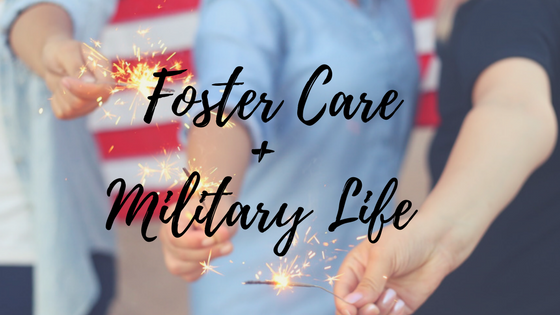|
Hey there, friends. I know this space has been eerily quiet recently and I'm sorry. It turns out when you are launching a book, it feels like you're yelling in a lot of different directions, and some (aka MANY) parts of your life get pushed aside. It seems weird to have pushed away a writing space when you're saying "Hey! Look what I have written!" but I don't think I had any words left after launching my first book, so it's probably for your benefit. If you've been here a while, you may be wondering, what's happening with McKinley? Or if you're new here, you are like "What am I even doing here, I don't know who this person is?!" Either way, I need to let you in on a little secret that is about to infiltrate our entire little world with a whole lot of love - we are getting another foster babe! I have approximately one million things I want to tell you about this little fella, but I'm going to save that for a post next week. For now, I want to share an article I wrote for our local Foster Care Newsletter that answers one of the most common questions I get, "How difficult is it to serve as a Foster Family when you're in the military?" I answer that question a lot, and wanted to offer up a little insight into why I believe that Military Families are incredibly well-suited to be amazing foster parents. So without further ado, here is the article I wrote... It was a crisp, autumn afternoon in Virginia and my phone began to ring. I slid my finger across the screen and put the phone to my ear, “Are you sitting down?” my husband asked.
My heart dropped. What could it be? He had just gotten back from a six-month deployment two weeks earlier. Please tell me he isn’t going again. Has someone died? The questions kept brewing in my brain before I had the strength to find a chair. “Yes, I’m sitting. Is everything ok?” “You’re never going to believe this,” he said, “but I just got orders and we are moving to Hawai’i!” “Are you serious? That’s amazing!” I retorted, “But please, don’t ever scare me like that again.” For the next several months, I dreamt about palm trees, beautiful beaches, learning the Hawaiian culture, and obtaining the golden tan I always longed for as a child. Little did I know that there was so much more for us to discover during our tour in Hawai’i. Any military family knows that the moving process is all consuming. It took us at least a month before we began to surface above the boxes and packing paper and logistics that come with moving an entire household across an ocean. But, once the dust had settled, we were excited to face our Hawaiian adventure head-on. That’s when we met Mary and Troy. They lived just a few doors down from us on base, with children the same ages as our own. But, in addition to their biological children, Mary and Troy were also serving as resource caregivers. I had never met a military resource family before, and was intrigued by the idea of it. I began bombarding them with questions about the licensing process and how foster care intersects with military life. I mean foster care is so unpredictable, so uncertain, so emotionally draining, right? Could my little military family handle it? And then, as if the answer fell from the sky, I realized that these struggles weren’t so foreign to me after all. Aren’t we, as military families, experts at handling unpredictable situations— like when orders come through at the last minute? Are we not adept at wading through uncertain waters of pending deployments and imminent Temporary Duty Assignments? Don’t we guide our families through all of the emotions that are associated with moves and deployments, however draining it may be? In many ways, the struggles of resource families are the same ones military families face. Maybe we could handle it, I thought, but is two to three years enough time to make a difference? It was about this time in our foster care exploration that I read this quote by Mother Teresa, “We know only too well that what we are doing is nothing more than a drop in the ocean. But if the drop were not there, the ocean would be missing something.” The words hit me like a ton of bricks. Serving doesn’t have to look like a twenty-year investment. It doesn’t take decades to love your neighbors well. Mother Teresa’s words pierced my heart and reassured me that while our transient lifestyle doesn’t allow us to invest long-term in communities, we must not forego the opportunities afforded to us in the short-term. As much as the frequent moves seem to disrupt our lives as military families, I choose to see them as opportunities for new beginnings. Here in Hawai’i we have chosen to serve as resource caregivers, but when we move away from the island, our service to our new community might look different. The choice to foster while on military orders is a temporary commitment, which allows each family to fully invest in the system for a finite time period. For us, foster care looked like the right short-term opportunity. In December of 2015 we received our first foster placement. During his time in our care, we dealt with bumps along the way and faced any uncertainty head-on while wondering how long he would remain in our home. But most importantly, through this experience, we have been able to not only enjoy the opportunities Hawaii has to offer, but also invest in its communities—giving back just a portion of the gifts Hawai’i has given us. In May 2016, we said “good-bye” to our first foster child, as he went to live with family. I wondered how my boys, ages four and two, would respond. He was very much a part of our family, but I was surprised his departure didn’t rock the family boat more. My boys still ask about him, but they aren’t distraught. They still include him in family drawings, but aren’t grieving. I, on the other hand, have been a bit of a mess at times. Why are they so resilient? Sure, part of it comes from the innocence of youth, but I realized soon after our foster child’s departure, that the boys talk about him much like they talk about their friends from Virginia. Their experience as military kiddos has prepared them well for this transition. Their ability to love deeply while in the presence of friends, but also transition into a new normal without their friends is simply a byproduct of being a military brat. I clearly have a lot to learn from my boys. While I never imagined that the military life would lead us to foster care, the connection isn’t too far off base. After all, in order to serve our nation well, we have to adequately care for our local community. And so, we are incredibly grateful for the opportunity to serve as resource caregivers and invest in the people of Hawai’i for as long as Uncle Sam allows. ***This article was original published in Hui Ho'omalu's Building Connections Newsletter
0 Comments
Leave a Reply. |
McKinleyI am a lover of people, a child of God, and a laugher at jokes. I write words, cry tears and smile at strangers.
Archives
March 2017
Categories
All
|



 RSS Feed
RSS Feed